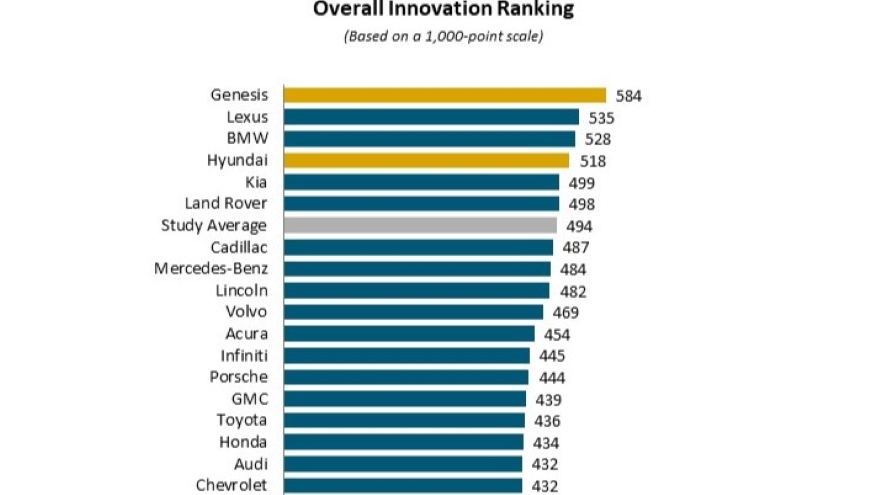J.D. Power study suggests drivers becoming overwhelmed by unnecessary technology

Image courtesy of J.D. Power.
By subscribing, you agree to receive communications from Auto Remarketing and our partners in accordance with our Privacy Policy. We may share your information with select partners and sponsors who may contact you about their products and services. You may unsubscribe at any time.
Automakers love to load up their new models with the latest technology.
But is there a point at which it’s too much?
J.D. Power’s latest research suggests that point might have been reached. The 2024 U.S. Tech Experience Index Study, focused on the user experience with advanced vehicle technologies as they come to market, showed many owners are becoming overwhelmed by tech features that don’t solve a problem, don’t work, are difficult to use or are too limited in functionality.
Those features don’t include artificial intelligence-based technologies, including smart climate control, which are popular with car owners who have used them.
But others, such as facial recognition, fingerprint reader and interior gesture controls, were rated poorly in the survey of 81,926 owners of new 2024 model-year vehicles, conducted from July 2023 through May 2024.
In a news release, J.D. Power said those technologies “unsuccessfully try to solve a problem owners didn’t know they had.” For example, not only did a high percentage of drivers report problems with interior gesture controls (43.4 problems per 100 vehicles), newly added diagnostic questions in this year’s study found 21% of those drivers also said it lacks functionality.
Subscribe to Auto Remarketing to stay informed and stay ahead.
By subscribing, you agree to receive communications from Auto Remarketing and our partners in accordance with our Privacy Policy. We may share your information with select partners and sponsors who may contact you about their products and services. You may unsubscribe at any time.
Those numbers, J.D. Power said, show that technology is a “lost value” for car manufacturers that bring it to market.
The 2024 study addresses that issue by including a new return on investment analysis as part of its findings, using data science to cluster technologies into three categories — must have, nice to have and not necessary — designed to allow automakers to better align their strategy with customer expectations.
Kathleen Rizk, J.D. Power’s senior director of user experience benchmarking and technology, said while there are many innovative technologies answering customer needs, “this year’s study makes it clear owners find some technologies of little use and/or are continually annoying.”
“J.D. Power’s ability to calculate the return on investment for individual technologies is a major step in enabling carmakers to determine the technologies that deserve the most attention while helping them ease escalating costs for new vehicles,” she said.
Among the technologies that scored poorly in functionality are advanced driver assistance systems. While most car owners like features such as blind spot warnings that directly address specific concerns, they’re less positive about other ADAS features they consider unnecessary.
That feeling was strongest regarding active driving assistance. The hands-on-the-wheel version was among the lowest-rated ADAS technologies with a usefulness score of 7.61 on a 10-point scale. The hands-free didn’t do much better, scoring 7.98, which J.D. Power said “can be attributed to the feature not solving a known problem.”
Genesis, Hyundai, Tesla lead tech innovation
For the fourth consecutive year, Genesis posted the highest overall score for innovation at 584 on a 1,000-point scale, topping premium brand list ahead of Lexus (535) and BMW (528) ranks third.
Among mass-market brands, Hyundai ranked No. 1 for the fifth year in a row with a score of 518, followed by Kia (499) and GMC (439).
“We appreciate this recognition for cutting-edge tech because we work hard to put the customer at the center and work to make sure the tech viscerally connects,” Hyundai Motor North America senior vice president of product planning and mobility strategy Olabisi Boyle said. “It’s important that the tech is innovative and enhances safety and provides a driving experience that is safer, smoother and more satisfying.”
That said, Tesla — one of three brands that were scored but not were not included in the rankings because they didn’t meet the eligibility criteria — led all brands at 786, with fellow electric vehicle manufacturers Rivian and Polestar at 666 and 578.
There might be trouble in Tesla’s tech paradise, though. J.D. Power said there are signs of lower satisfaction as the brand’s customer base expands beyond tech-hungry early adopters, with low scores for features such as direct driver monitoring (7.65).
The study also ranked vehicle models for advanced technology in four categories: convenience, emerging automation, energy and sustainability, and infotainment and connectivity.
The convenience award went to the Toyota Sequoia for its camera rear-view mirror technology. The premium segment is not eligible for the category.
The Genesis GV70 (premium) and Kia Carnival (mass-market) earned the emerging automation awards, both for front cross traffic warning systems.
The BMW iX won for energy and sustainability for one-pedal driving. The mass market segment is not eligible in that category.
Hyundai’s Santa Fe (mass-market) and BMW’s X6 (premium) ranked highest for infotainment and connectivity for their phone-based digital keys.


